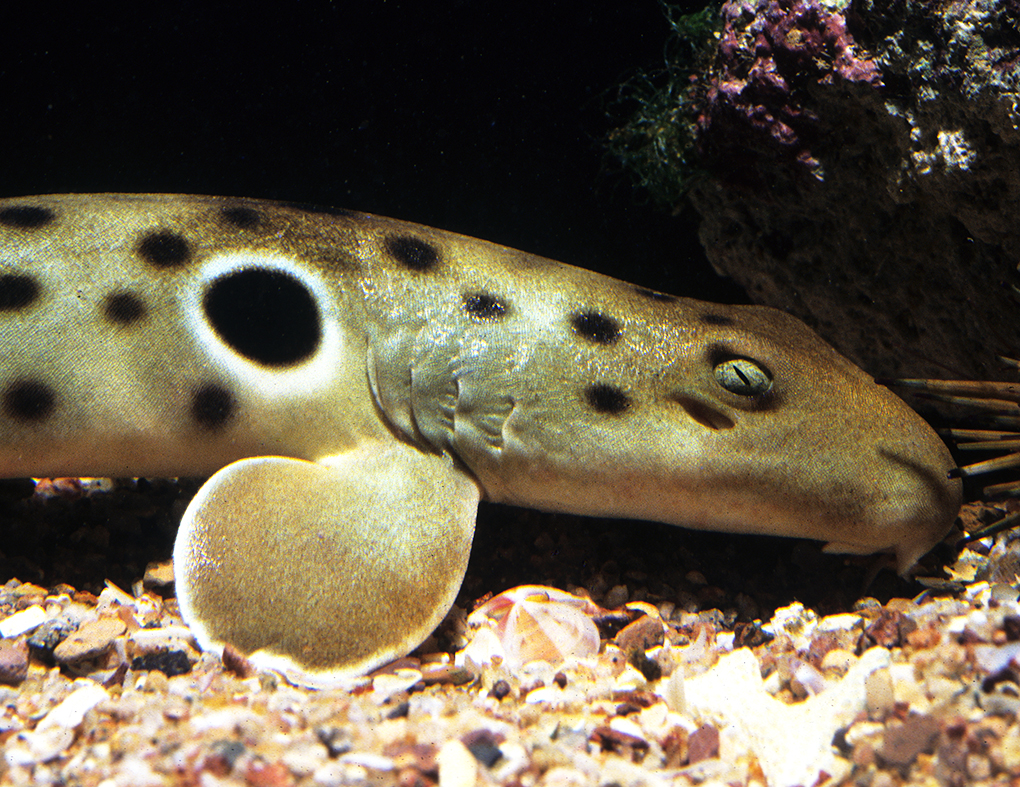Genus Hemiscyllium
By Scott W. Michael
Excerpt from CORAL Magazine, September/October 2021
REFERENCES
References
Allen, G.R., Erdmann, M.V., White, W.T. and Dudgeon, C.L., 2016. Review of the bamboo shark genus Hemiscyllium (Orectolobiformes: Hemiscyllidae). Journal of the Ocean Science Foundation, 23, pp.51-97.
Allen, G.R., Erdmann, M.V. and Dudgeon, C.L., 2013. Hemiscyllium halmahera, a new species of Bamboo Shark (Hemiscylliidae) from Indonesia. Aqua–International Journal of Ichthyology, 19(3), pp.123-136.
Bennett, M.B., Heupel, M.R., Bennett, S.M. and Parker, A.R., 1997. Sheina orri (Myodocopa: Cypridinidae), an ostracod parasitic on the gills of the epaulette shark, Hemiscyllium ocellatum (Elasmobranchii: Hemiscyllidae). International journal for parasitology, 27(3), pp.275-281.
Cornish, A.S., 2005. First observation of mating in the bamboo shark Hemiscyllium freycineti (Chondrichthyes: Hemiscylliidae). ZOOLOGICAL STUDIES-TAIPEI-, 44(4), p.454.
Crow, G.L., 2004. Goiter in elasmobranchs. The Elasmobranch Husbandry Manual: Captive Care of Sharks, Rays and their Relatives. Ohio Biological Survey, Columbus, Ohio, pp.441-446.
Dingerkus, G. and DeFino, T.C., 1983. A revision of the orectolobiform shark family Hemiscyllidae (Chondrichthyes, Selachii). Bulletin of the AMNH; v. 176, article 1.
Dudgeon, C.L., Corrigan, S., Yang, L., Allen, G.R., Erdmann, M.V., Sugeha, H.Y., White, W.T. and Naylor, G.J., 2020. Walking, swimming or hitching a ride? Phylogenetics and biogeography of the walking shark genus Hemiscyllium. Marine and Freshwater Research, 71(9), pp.1107-1117.
Fahle, S.R. and Thomason, J.C., 2008. Measurement of jaw viscoelasticity in newborn and adult lesser spotted dogfish Scyliorhinus canicula (L., 1758). Journal of Fish Biology, 72(6), pp.1553-1557.
Gervais, C.R., Nay, T.J., Renshaw, G., Johansen, J.L., Steffensen, J.F. and Rummer, J.L., 2018. Too hot to handle? Using movement to alleviate effects of elevated temperatures in a benthic elasmobranch, Hemiscyllium ocellatum. Marine Biology, 165(11), p.162.
Heinrich, D.D., Rummer, J.L., Morash, A.J., Watson, S.A., Simpfendorfer, C.A., Heupel, M.R. and Munday, P.L., 2014. A product of its environment: the epaulette shark (Hemiscyllium ocellatum) exhibits physiological tolerance to elevated environmental CO2. Conservation Physiology, 2(1), p.cou047.
Heupel, M.R. and Bennett, M.B., 1998. Observations on the diet and feeding habits of the epaulette shark, Hemiscyllium ocellatum (Bonnaterre), on Heron Island Reef, Great Barrier Reef, Australia. Marine and Freshwater Research, 49(7), pp.753-756.
Heupel, M.R. and Bennett, M.B., 1999. The occurrence, distribution and pathology associated with gnathiid isopod larvae infecting the epaulette shark, Hemiscyllium ocellatum. International Journal for Parasitology, 29(2), pp.321-330.
Heupel, M. R. and M. B. Bennett. 2007. Estimating Abundance of Reef-Dwelling Sharks: A Case Study of the Epaulette Shark, Hemiscyllium ocellatum (Elasmobranchii: Hemiscyllidae) 1. Pacific Science, 61(3), pp.383-394.
Jutan, Y., Retraubun, A.S.W., Khouw, A.S., Nikijuluw, V.P.H. and Latumaerissa, H.S., 2019, October. The food composition of Halmahera walking shark (Hemiscyllium halmahera). In IOP Conference Series: Earth and Environmental Science (Vol. 339, No. 1, p. 012007). IOP Publishing.
Jutan, Y., Retraubun, A.S.W., Khouw, A.S., Nikiju-luw, V.P.H. and Pattikawa, J.A., 2018. Study on the population of Halmahera walking shark (Hemiscyllium halmahera) in Kao Bay, North Maluku, Indonesia. Interna-tional Journal of Fisheries and Aquatic Studies, 6(4), pp.36-41.
Michael, S. W. 2001. Aquarium Sharks. Microcosm/TFH, Neptune City, NJ. 256 pp.
Morris, A.L., Hamlin, H.J., Francis-Floyd, R., Sheppard, B.J. and Guillette Jr, L.J., 2011. Nitrate-induced goiter in captive whitespotted bamboo sharks Chiloscyllium plagiosum. Journal of Aquatic Animal Health, 23(2), pp.92-99.
Payne, E.J., 2012. Husbandry and growth rates of neonate epaulette sharks, Hemiscyllium ocellatum in captivity. Zoo biology, 31(6), pp.718-724.
Peach, M.B., 2002. Rheotaxis by epaulette sharks, Hemiscyllium ocellatum (Chondrichthyes: Hemiscylliidae), on a coral reef flat. Australian Journal of Zoology, 50(4), pp.407-414.
Soderstrom, V., Renshaw, G.M. and Nilsson, G.E., 1999. Brain blood flow and blood pressure during hypoxia in the epaulette shark Hemiscyllium ocellatum, a hypoxia-tolerant elasmobranch. Journal of experimental biology, 202(7), pp.829-835.
West, J.G. and Carter, S., 1990. Observations on the development and growth of the epaulette shark Hemiscyllium ocellatum (Bonnaterre) in captivity. Journal of Aquariculture and Aquatic Sciences, 5(4), pp.111-117.
Wise, G., Mulvey, J.M. and Renshaw, G.M., 1998. Hypoxia tolerance in the epaulette shark (Hemiscyllium ocellatum). Journal of Experimental Zoology, 281(1), pp.1-5.
SPECIAL THANKS
Special thanks to Vanessa Sommers of Oceans Reefs and Aquariums (https://www.orafarm.com/) for providing information about epaulette shark breeding and husbandry.





